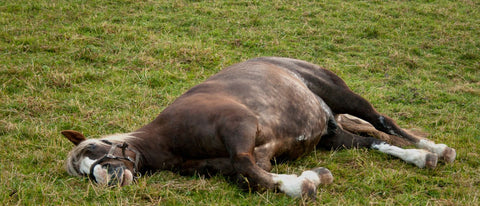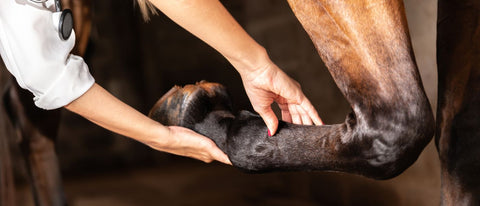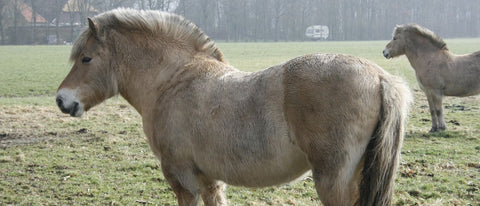
Florian ist aufgewachsen auf einem Bauernhof. Umgeben von Pferden, entdeckte er früh seine Faszination für diese majestätischen Tiere. Inspiriert von seiner reitbegeisterten Mutter, entwickelte er das Nahrungsergänzungmittel - Pferdegold. Seine tiefe Verbundenheit zur Natur und die leidenschaftliche Hingabe zu Pferden trieben ihn an, sein Unternehmen zu gründen.
Horses roll for various reasons, such as grooming, massage, relaxation, and itching relief. This natural behavior supports their thermoregulation and promotes blood circulation, which is essential for healthy skin and muscle tissue.
As a horse owner, you should offer a safe place to roll around every day so that your horse can develop freely and benefit from this positive ritual.
Why do horses love to roll around?
Horses roll because they are giving in to a natural need that supports their body care and relaxation. This behavior, whether in
- Sand,
- mud
- or on the floor, contributes significantly to well-being.
It is easy to explain why a horse rolls: it is looking for a natural massage , cleaning itself and possibly marking its territory.
The benefits of rolling for horses
Rolling has numerous positive effects on a horse's body and mind. It contributes to natural coat care and acts as a natural massage , relieving tension in the muscles . In addition,
- it promotes blood circulation
- and supports the connective tissue
- as well as the function of reflex zones and acupuncture points .
This strengthens the entire supporting structure and ensures a healthy spine .
Rolling also helps reduce stress , regulate thermoregulation and relieve itching – which also prevents skin irritation.

Rolling as natural coat care
Horses use rolling to rid their coats of dirt , loose hair, and parasites . This behavior plays a particularly crucial role during the shedding season , as it effectively removes excess hair and impurities. You can read how you can support your horse during the shedding season in this article.

Pferdegold® supplementary feed!
Pferdegold is a small family business from Bavaria with a big dream: to produce the best horse feed. We see ourselves as a family of equestrians who want to provide your horse with the ideal nutrition. 100% natural and perfectly tailored to your horse's needs.
Try it now!Rolling as a soothing massage
When a horse rolls, it simultaneously exerts a soothing massage on its muscles and connective tissue . The pressure created by rolling helps
- to relieve tension
- and promote blood circulation.
This not only makes the animal feel more relaxed, but also benefits from a natural loosening of the muscles.
Understanding the rolling behavior of horses
When rolling, each horse exhibits individual rituals – some begin with a brief pawing before spreading out with pleasure on a particular surface. Popular materials for this behavior are sand , earth , and mud .
In a herd, this behavior often seems "contagious," because if a single animal observes the rolling, the others often follow. The hierarchy within the herd can play a role , as high-ranking animals often prefer the best spots and thus influence the rolling behavior.
Rolling in the herd: A social ritual
In the herd , rolling serves not only as a form of grooming but also as a form of territory marking . The animal spreads its characteristic scent, and the order in which the animals roll often results from their social rolling order . Such a ritual strengthens the sense of community and contributes to social cohesion.
Health aspects of rolling
Healthy rolling behavior is usually an excellent sign of your horse's well-being . It shows that the animal is comfortable and in good shape.
On the other hand, skin problems or injuries can lead to limited or altered rolling.
Rolling with colic: curse or blessing?
For a long time, the common belief was that horses shouldn't roll when suffering from colic. However, recent studies show that in some cases, rolling can even help loosen intestinal obstructions . Nevertheless, if you notice any signs of colic , you should consult a veterinarian immediately.
How to support your horse’s natural need to roll
As a horse owner, you can play a significant role in helping your horse fulfill its natural need to roll. It is advisable to provide your horse with a safe and suitable place to roll every day – ideally
- in the wild
- or in a fenced area.
Make sure the area is free of sharp objects and does not pose a risk of injury to the horse.
Special care is also required for horses with skin problems or injuries . Observing their rolling behavior is also important to detect any changes early on.
Choosing the right rolling station
A good rolling area should be level and free of obstacles. Suggested flooring such as sand, earth, or special mats provide the horse with a safe and comfortable surface.
When designing, make sure that there are no sharp or pointed objects to avoid injuries.
Here is a short checklist:
- Choice of flooring: Sand, earth or special mats are very suitable.
- Minimize risk of injury: free from sharp objects and other sources of injury.
- Suitable surfaces: These should be flat and level.
Horses with skin problems: Should they roll or not?
In horses with existing skin problems or injuries, rolling can cause additional irritation . In such cases, alternatives such as protective blankets or special protective equipment are recommended to support the animal without stressing its skin.
Special features of rolling: What else you should know
In addition to the points already mentioned, there are other aspects of rolling behavior that may be of interest. The different rolling techniques —whether in individual stalls or on pasture —demonstrate how diverse and individual this behavior is.
Especially after riding , when the horse has sweated, rolling is used as a method to remove sweat from the body . A horse's natural need to roll is very complex and can reflect various environmental influences.

Perfect for your horse: Pferdegold® supplementary feed!
These specially developed supplements support your horse's diet and provide it with natural nutrients. Made in Germany, grain-free and drug-free, they come with a 30-day money-back guarantee.
Try it now!Conclusion
In summary, rolling is an essential, natural behavior for horses, which contributes to coat care, relaxation and promoting blood circulation.
It improves muscular and physical condition and is a sign of natural well-being. As a horse owner, it is your responsibility to support your horse's need to roll by providing safe and suitable rolling areas.
FAQ
Why do horses roll in the sand?
Horses use sand not only for massage, but also to remove dirt, loose hair, and parasites. Sand provides a pleasant, slightly abrasive surface that supports coat grooming.
Why do horses roll in the mud?
Rolling in the mud helps cool you down, relieves itching, and offers some protection from insects, as the mud forms a protective layer on the skin.
Why do horses roll after showering?
After showering, rolling helps dry the wet fur and remove excess dirt. It's a natural way to improve body awareness.
Is it bad if my horse doesn't roll?
A prolonged period without rolling may indicate health problems or poor posture. If your horse doesn't roll, you should closely monitor its environment and health.
What can I do if my horse rolls too often?
Excessive rolling can indicate itching, pain, or boredom. It's important to investigate possible causes—such as skin problems or emotional deficits—and consult a doctor if problems arise.
Important:
Pferdegold is not a substitute for veterinary diagnosis or treatment. The information contained in this article is for general informational purposes only and is intended to help improve your horse's well-being.
Pferdegold products do not treat or cure diseases, but rather support your horse in compensating for nutritional deficiencies through targeted nutrient intake.
However, they are not a substitute for professional advice from a veterinarian or specialist. If your horse has any health problems, we strongly recommend consulting a veterinarian. Pferdegold assumes no liability for decisions made based on the information provided here.
🐎 You want to read more about horse health:

















